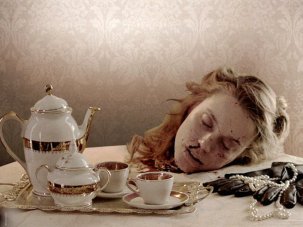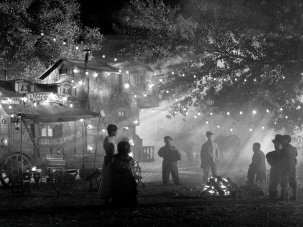Renata: You know, if this were a movie, we wouldn’t pass the Bechdel test.
Isabelle: What is the Bechdel test?
Renata: You ask a movie three questions: Are there female characters with names? Do these female characters with names talk to each other? Do they talk about something besides men?
— Jonás Trueba’s The Romantic Exiles, LFF 2015
With a selection of films that covered the collective struggle of the suffragette movement to individual women’s battles for the right to determine their own destinies, this year’s London Film Festival was ringingly declared in advance to be the ‘strong women’ festival by its artistic director Clare Stewart. The stir caused at the festival’s opening film, Suffragette, when a group of feminists lay down on the red carpet in protest at cuts to domestic violence services, not only bore this out but demonstrated, yet again, that in regards to gender inequality and abuse, in one of the protester’s words, “the battle isn’t over yet.” The films I’ve chosen to focus on in my LFF round-up – Spanish-language in the main, plus one French film shot in Spain and one Italian – would all indicate, both in their subject matter and behind the camera, that women were indeed the festival’s clear protagonists this year.
Women are the sole object of a male quest in Jonás Trueba’s third feature, the delightfully low-key The Romantic Exiles, in which three young men cross from Spain to France in a van in search of their lost loves (two of whom are quoted above). Yet Trueba is after something different than the straightforward idealisation of these women; instead he shatters these three young men’s illusions about their ‘dream’ girls and confronts them with their nymphs’ own desire to develop themselves, through work, family or both, revealing the inability of the young men to match their maturity or meet their needs. Shot on the fly, the film evinces a light touch and manages once more (like Trueba’s The Wishful Thinkers, screened at the 2013 LFF) to capture that ethereal, transient moment on the cusp of adulthood. It’s a film that rejoices, as do his characters, in the silliness and magic of small, carefree gestures, like singing along to the same tune in a car, or stripping down for an impromptu swim in a lake.
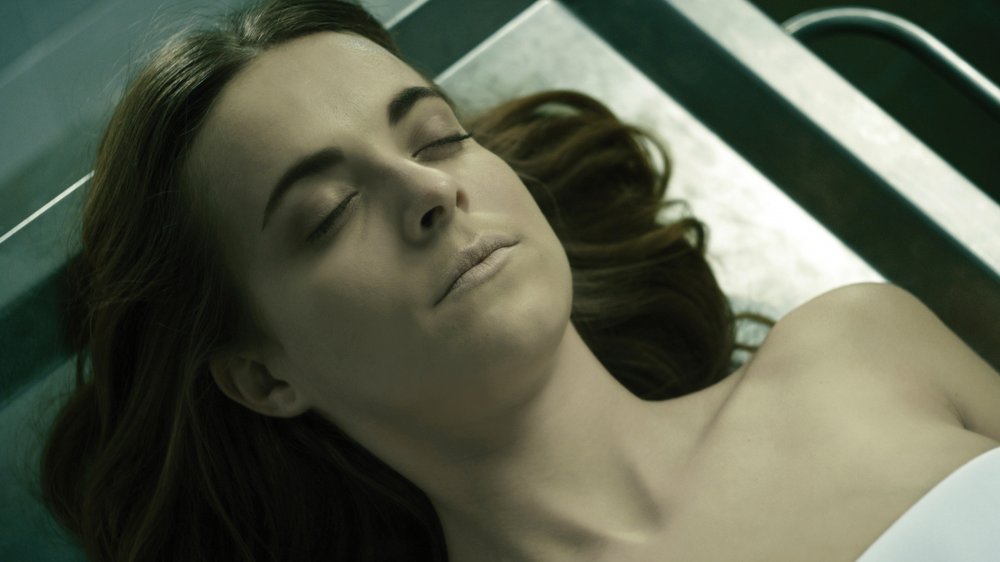
The Corpse of Anna Fritz (2015)
The fetishisation and idealisation of a woman – in this case a dead one – was the subject of a film by another Spaniard, Hèctor Hernández Vicens, in a debut horror with the promising title The Corpse of Anna Fritz. Unfortunately, all the promise ended right after the title credits. When the eponymous Anna Fritz – a Penélope Cruz-like international actress – dies young, a group of three men, far less romantically disposed, shall we say, than Trueba’s, visit her in the morgue for a spot of necrophilic worship. The premise of woman-as-object was certainly pushed to the extreme here, but proved to be somewhat empty, since the film turned into a cat-and-mouse chase that offered jolts instead of insight into the obsession with celebrity culture and the brutal sexism it incontestably breeds. Nevertheless, this same cat-and-mouse dynamic strangely echoed the experience of several other female leads at the hands of men in films I saw at the festival.
There were, for example, several Latin American films directed by men – from Argentina, Eugenio Canevari’s Paula and Santiago Mitre’s Paulina, and Chilean Sergio Castro San Martín’s The Mud Woman – which all have at their centre a woman who falls victim to sexual assault by a man or group of men. The three female protagonists all end up bearing the child of their attackers, and each confronts the perpetrators in one way or another. All three films firmly situate their narratives in class divisions, but the economic circumstances of these three women – and the ways in which they try to take charge of their own futures – vary massively. Of the three films, the most controversial was Paulina, Mitre’s assured second feature after his much acclaimed and awarded The Student.
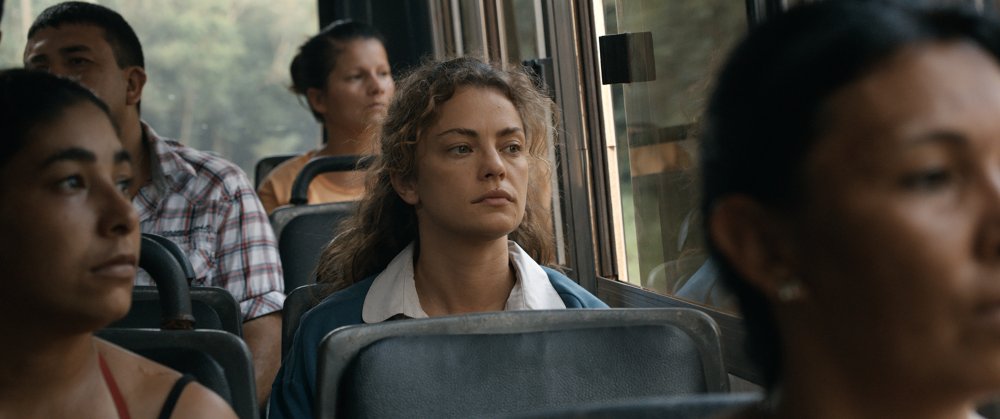
Paulina (2015)
A remake of cult 1960s Argentine film La Patota, and co-written with Mariano Llinás, Paulina portrays a young law PhD student, daughter of a powerful liberal judge, who decides to leave it all and instead teach politics in a rural school in a marginalised, deprived area of Argentina. Within days she is gang-raped, and although she ends up finding out everyone involved, she decides not to turn them in but to continue with her life, to confront the actual perpetrator and to keep the baby – “because that child is the consequence of the violence in the world.”
Mitre’s stance on Paulina’s convictions is deliberately distanced and distancing; we never quite know what really lies behind Dolores Fonzi’s inscrutable countenance. Instead Paulina is very careful in exposing everyone’s version of the story, and a series of one-to-one expository debates between father and daughter are orchestrated to signal where their political and social positions lie. For Paulina, “when there are poor people involved, justice does not look for the truth but for guilty ones.”
Mitre clearly relishes the ambiguity he creates, and although he never judges anybody, that Paulina decides to stick to her decisions is both challenging and frustrating at times. Her exercise of her right to choose to let her attackers go (which given her social status feels oddly like a privilege) only serves to place a question mark over her convictions. What if, for example, Paulina’s attackers were the same ones who raped both Paula and María, the respective protagonists of Paula and The Mud Woman? The fact that I saw Paulina after the other two films, where the two women protagonists are economically dependent on their attackers, made Paulina seem at times disconnected from the bigger picture she’s so keen to represent.
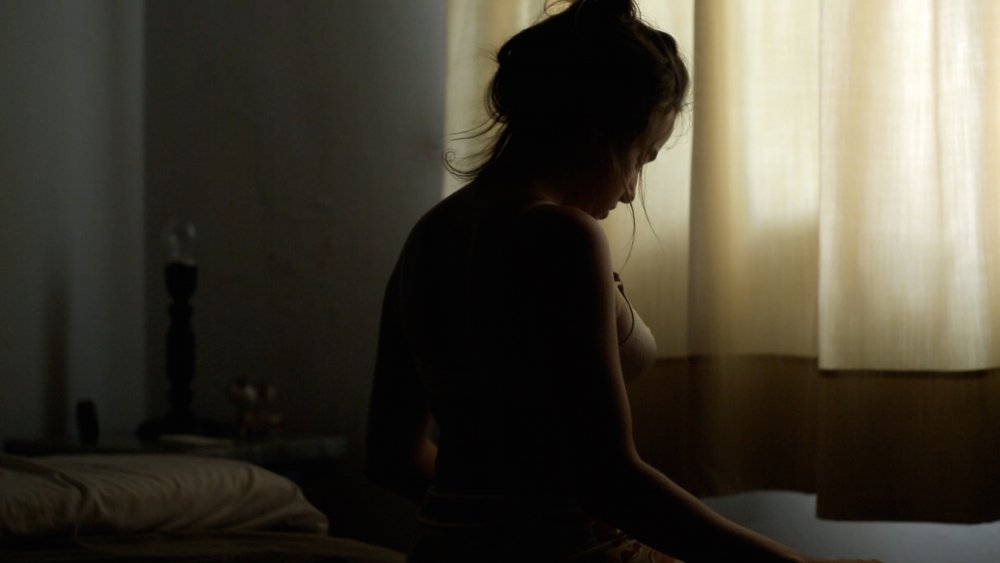
Paula (2015)
In the dexterously observed Paula, the eponymous protagonist is a young in-house babysitter who spends the whole of the film trying to get together enough money to pay for the termination of an unwanted pregnancy. Director Canevari captures Paula’s routines day in, day out, performed with the heavy tread of someone who knows she’s not going to find a way out anytime soon. He slowly reveals who the father most probably is, closing her in tighter into the class struggle she’s inescapably trapped in.
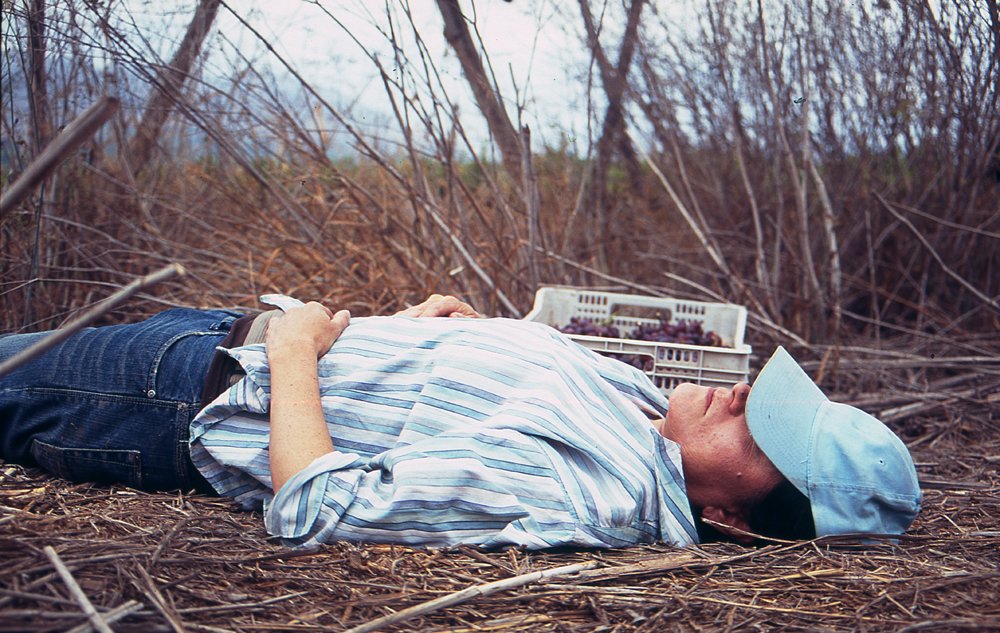
The Mud Woman (La mujer de barro, 2015)
On the other side of the border, in The Mud Woman, Castro San Martín’s middle-aged María picks up the story from the younger Paula and Paulina in the arid landscape of northern Chile, some years further on in life. Also raped in her youth, María bore the daughter, only now to experience a repeat of the ordeal at the hands of the same perpetrator. In a film about abuse, economic as much as sexual, Castro San Martín juxtaposes the harsh conditions of itinerant workers – here mostly women – with the repetitive abuse that María is subjected to. That she takes it into her own hands to free herself by performing a similar act of humiliation on her assailant separates her markedly from Paula and Paulina. But all three female protagonists are defined by a certain remoteness, a trait that clearly speaks to the impossibility of fully understanding their complex situations, personal and social – and perhaps a small hint that their male directors can’t completely decipher them?
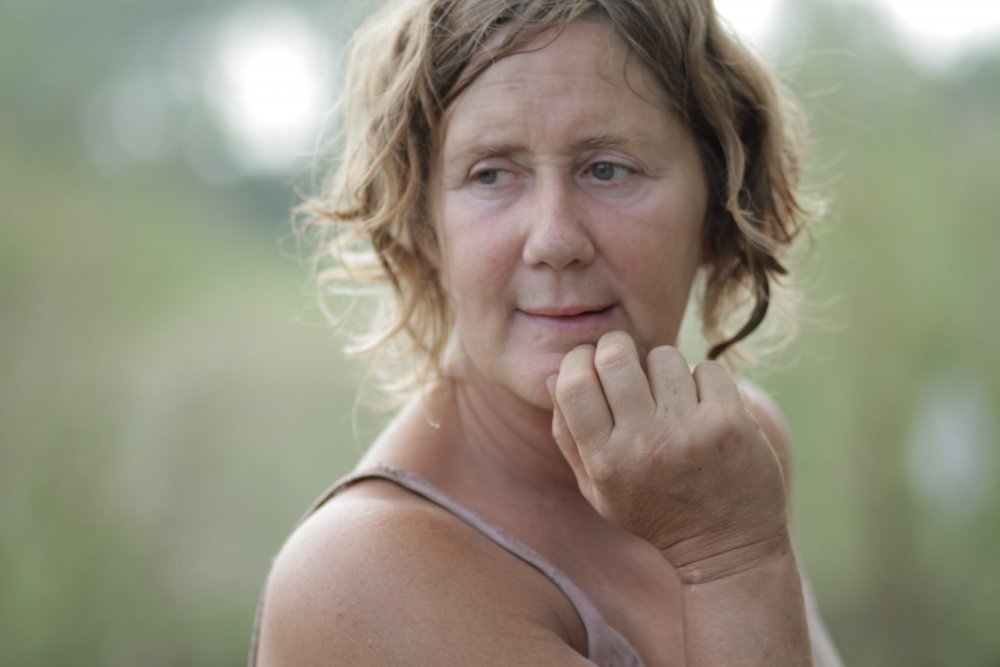
Dog Lady (La mujer de los perros, 2015)
That said, the most inscrutable of all the female leads I came across at this year’s LFF has to be the unnamed protagonist after whom Argentine directors Laura Citarella and Verónica Llinás’s Dog Lady is named. Unlike the other women I’ve mentioned – desperately clinging onto sanity in a hostile male world – this one has literally disconnected, living in a shaft in the outskirts of Buenos Aires with only dogs as company. The deceptively simple sound design gives Citarella and Llinás’s virtually dialogue-free film not so much an observational feel as a defiant one – the metallic splash of a raindrop against a pan leads to an artificial guitar riff and a basic drum, seemingly out of place in this natural environment. The dog lady gets by on petty theft instead of begging, until a visit to the local church to steal some coins brings to the fore the longstanding battle of the sexes that has taken place in religion for centuries; the submissive parishioners on view are of course all women.
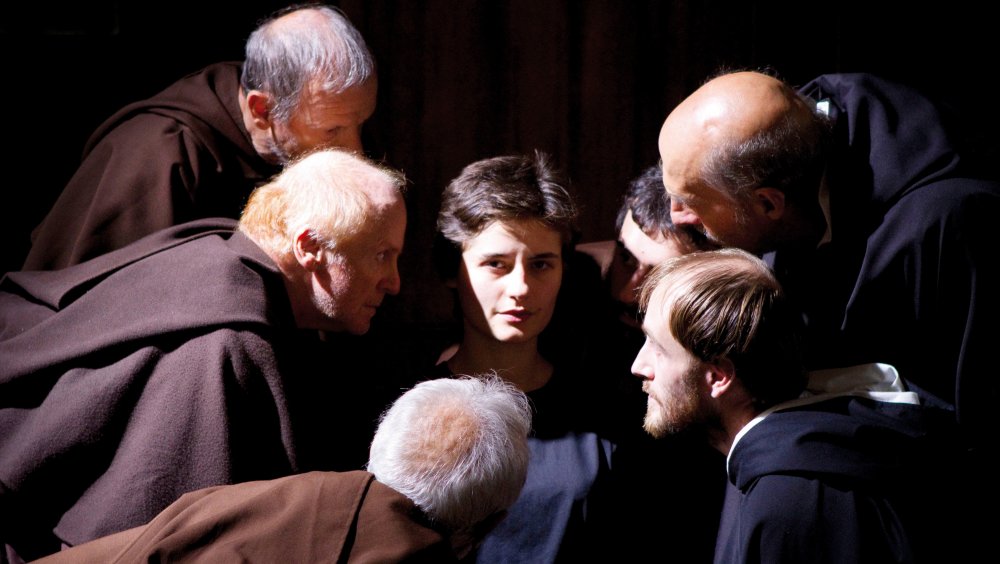
Blood of My Blood (2015)
The abuse of women at the hands of the Catholic Church comes under scrutiny in Blood of My Blood, directed by Italian maestro Marco Bellocchio, one of my highlights at the festival. A novice is accused of a pact with the devil, tortured, burned and impaled, simply because her beauty and sexuality had apparently overwhelmed a priest who may have been her lover. But it is the constant sense of threat hanging over these women that positions Bellocchio’s mesmerising film firmly in the realm of nightmares, closer to the horror genre than the social realism of Paula, Paulina and The Mud Woman.
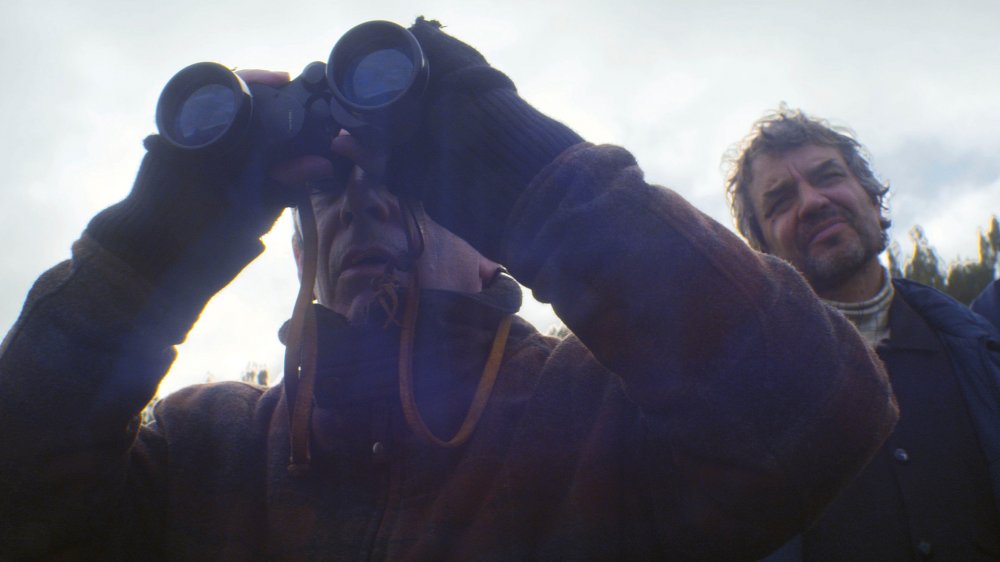
The Club (2015)
Horror is all too present in Pablo Larraín’s latest provocation, The Club, which with four priests as protagonists hardly qualifies as a film about women – except for the fact that Sister Mónica, like a female Cerberus dog who guides lost souls into hell, acts as their guardian (although she’s definitely no angel). Sister Mónica is in charge of one of the Vatican houses where sinful priests – here mainly guilty of paedophilia – are made to ‘disappear’ from the public eye, a sort of pre-hell limbo. Until, that is, one of their former congregation comes knocking at the door to denounce the priests’ abuse, provoking the suicide of a newcomer. Ultimately the full horror of their personal stories is unleashed when a Theorem-style figure – a Jesuit – turns up to investigate.
That Larraín has filmed these priests’ confessions literally straight to camera is both confrontational and hugely effective. When I interviewed him during the LFF he suggested that, rather than confronting the viewer, these close-ups invite a certain compassion for the ‘curitas’ (or ‘little priests’, as the victim refers to them, in a deeply unsettling mix of affection and belittlement). For a few, that confessional proximity will bring back nightmarish childhood memories of cheap wine on the breath and provoke a shudder down the spine, for as Larraín insisted, the way The Club works is mostly dependent on what the viewer supplies from their own experiences.
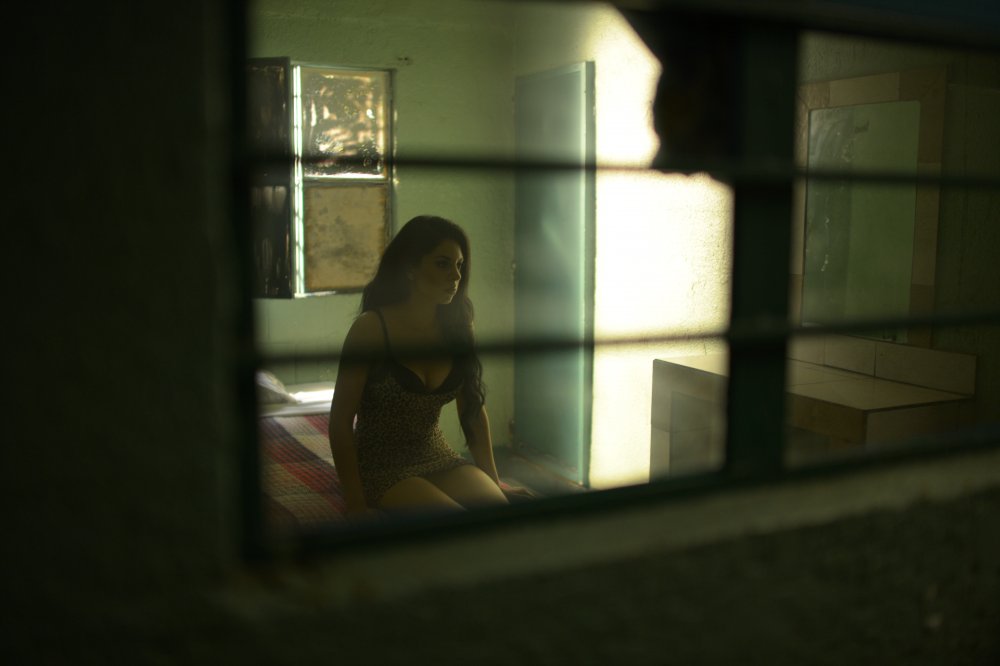
The Chosen Ones (Las Elegidas, 2015)
A similar technique of confessional face-to-face is deployed by Mexican David Pablos in his small yet outstanding debut The Chosen Ones, in which gullible teenage girls from families where parents (particularly fathers) are absent are lured into the world of prostitution. Rather than priests confessing to their crimes, here it is the actual sexual act that is metaphorically re-enacted instead. Sex is never shown on screen, but Pablos carefully edits close-ups of the teenagers and their clients to a gruesome, layered sound design, which not only multiplies the impact but literally confronts the viewer with the obscene grotesqueness of a young face smeared in exaggerated make-up, impassive to the grunts of an older man. This highlights their tender years as well as their vulnerability, adding a layer of surrealism to their forced profession, which is more akin to a vampiric exchange.
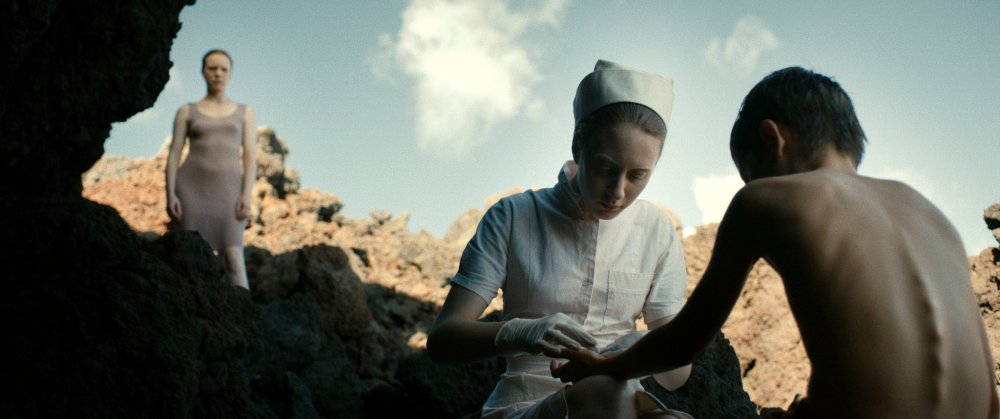
Evolution (2015)
Reproduction is the subject-matter of Frenchwoman Lucile Hadžihalilović’s jaw-dropping second feature Evolution – shot mainly in Lanzarote, and without a doubt my favourite entry in this year’s festival. It is also the most cryptic, aloof and inaccessible of all the films included here, as well as being hard to write about without revealing some of its wonderfully Lovecraftian pitch-dark sci-fi enigmas. In an island inhabited only by mothers of pre-pubescent boys, the act of birth becomes the stuff of nightmares as women take it literally into their own hands and cease to be the vessels for new life.
Evolution is tender and horrific, glacial and forlorn, but without doubt provocative, stimulating and imaginative in its take on gender roles. Hadžihalilović messes around with nature and rifts birth from motherhood in order to question both, in a story where boys’ coming of age is rendered female, as they are physically probed, coerced and violated as unwillingly as María, Paula, Paulina, Anna Fritz or Bellochio’s novices. Or indeed as Larraín’s boys – albeit within the confines of a purely matriarchal society in which ‘mother’ is rendered as a sort of amphibian clone-like entity.
With barely any dialogue Evolution relies strongly on its lyrical cinematography, where (wo)manmade hair-raising corridors and aseptic geometrical artificial spaces inspired by Giorgio de Chirico are contrasted with the sensuous movements and dread of the force of nature in numerous immersive sea-scenes. Water provides the suffocating medium in which these women stage a (literal) metamorphosis into the unknown world of adulthood that awaits these boys. To do so, Hadžihalilović offers a truly haunting version of (post?)-‘woman’ – whether dreamt by a boy or metaphorical is for the viewer to decide. Devoid of maternal instincts, this woman is probing, self-governing and free of men – whilst incidentally answering ‘no’ to the three opening questions. I couldn’t imagine a more thought-provoking film to close my very own woman-centric LFF.
-
Women on Film – all our coverage
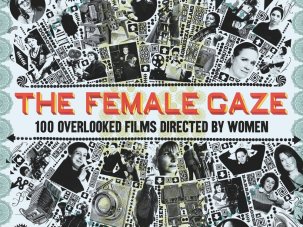
A window on our ongoing coverage of women’s cinema, from movies by or about women to reports and comment on the underrepresentation of women...
-
The Digital Edition and Archive quick link
Log in here to your digital edition and archive subscription, take a look at the packages on offer and buy a subscription.









